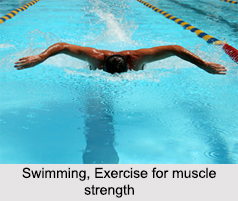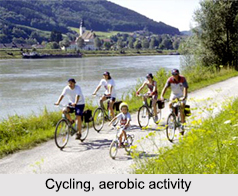 Exercise in Naturopathy is essential for the maintenance of normal condition of life. Lack of natural exercise is one of the principal causes of weakness and ill health. In recent years, the requirement for exercise has been recognised even in sickness. Exercises are now standard procedures in medicine to refurbish the use of muscles and nerves that have been injured by disease or by accident.
Exercise in Naturopathy is essential for the maintenance of normal condition of life. Lack of natural exercise is one of the principal causes of weakness and ill health. In recent years, the requirement for exercise has been recognised even in sickness. Exercises are now standard procedures in medicine to refurbish the use of muscles and nerves that have been injured by disease or by accident.
Exercise and Activity
It is vital to make a distinction between exercise and activity. While both are imperative as they are involved in essential physical movement, they differ in degree and benefits. Both make use of the body in voluntary movement. Activity uses the body to a limited degree and normally to achieve a specific purpose. Exercise employs the body over the widest possible range of movement for the particular purpose of maintaining or acquiring muscle tone and control with maximum joint flexibility. Activity requires less physical effort and often less conscious effort once the routine has been established. Exercise demands substantial physical effort and is more advantageous as mental concentration is simultaneously employed. However, naturopaths always recommend moderation and patients need to practice slowly and start with around 15 – 20 minutes of meditation before increasing the span. Yoga stimulates all the essential organs of the body. Stretching exercises in treatment of naturopathy is the fact that even old and feeble people can perform these workouts.
Methods of Exercise
A number of systems of exercise have been developed over the years, the most well-liked among them being the Swedish system and yoga asanas, the later having been practised from ancient times in India. Yoga is one of the most important naturopathic treatments. This ancient Indian method of cure includes moderate to intense postural exercises, meditation and breathing techniques known as Pranayama. Meditation is an integral part of nature cure treatments and can be performed by both young and old patients. Even when practiced for a short period, meditation is found to be extremely useful for the overall health. Naturopaths recommend sufferers to practice meditation in a calm and silent environment, ideally in a place in the lap of nature. This helps restore positive energy to the minds and bodies of patients, particularly when they are fasting. There is no side effect of meditation, and even practicing it for long hours does not cause any problems. These help to restore health to the all the glands within the body, and make them function in an optimal manner.
There is a correct balance in the level of all the hormones which are required for proper functioning of the minds and bodies of sufferers. Whichever system one may choose to take on, the exercises should be performed methodically, on a regular basis and under proper guidance. To be really functional, exercise should be taken in such a manner as to bring into action all the muscles of the body in a natural way. Stretching exercises are also used in naturopathy treatments. These are able to enhance the flexibility of the body and have a calming effect on the mind. When practiced regularly, these are able to increase the range of motion in patients. The muscles and nerves are relaxed and repaired. The overall metabolism of the body can be improved, which helps to remove toxins and mucus and boost the overall mental health. Walking is one such exercise. It is, however, so gentle in character that one must walk several kilometres in a brisk manner to add up to a fair amount of exercise.
 Other forms of good exercises are swimming, cycling, horse riding, tennis, etc. All those exercises have strong success rates in Musculoskeletal Disorder, Cardiac Rehabilitation, Cardio Vascular Disorder, Endocrine disorders, Digestive Problems, Gynaecological Disorders and Lifestyle Disorders.
Other forms of good exercises are swimming, cycling, horse riding, tennis, etc. All those exercises have strong success rates in Musculoskeletal Disorder, Cardiac Rehabilitation, Cardio Vascular Disorder, Endocrine disorders, Digestive Problems, Gynaecological Disorders and Lifestyle Disorders.
Benefits of Exercise
Regular exercise done appropriately can achieve the increased use of food by the body, which contributes to health and fitness. The basal metabolic rate and habitual body temperature will gradually rise during several weeks of physical exercise, if the programme is not too hard. The healthy person more often than not has abundant body heat and a warm radiant glow. Progressive physical exercise on a regular basis can bring about the balance of automatic, or involuntary, nervous system. Exercise can prevent or lessen gravitational ptosis or sag, as it is commonly called.
Improved capillary action in the working of muscular and brain tissue results from exercise carried to the point of real endurance. This permits greater blood flow and gives the muscles, including the heart, more resistance to fatigue. The full use of the lungs in vigorous exercise can reduce or prevent lung congestion due to lymph accumulation. Better respiratory reserve is developed by persistent exercise. This ensures better breath holding, particularly after a standard exercise. With greater respiratory reserves, exercises become easier. Consistent exercise leads to improvement in quality of blood. Systemic exercise promotes physical strength and mental vigour and strengthens will power and self control leading to pleasant development of the whole system.
Precautions in Exercise
Dynamic exercise of any kind should not be taken for an hour and a half after eating, or straight away before meals. Weak patients and those suffering from serious diseases like cancer, heart trouble, tuberculosis and asthma should not undertake vigorous exercise except under the supervision of an experienced physician. If exercising makes one tired, then he should stop immediately. The purpose of exercise should be to make one feel refreshed and relaxed and not exhausted. The most important rule about the fitness plan is to start with very light exercise and to increase the effort in gradual and easy stages. The sense of well being will begin almost immediately.




















